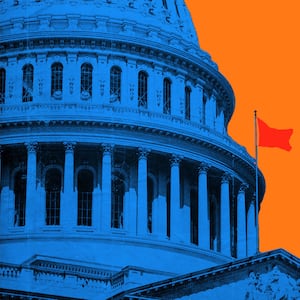If Democrats have been consistent on anything, it’s been their promise to make the wealthiest Americans pay their fair share in taxes.
Joe Biden campaigned on rectifying the unfairness of the U.S. tax code. So did Bernie Sanders. And most of the lawmakers populating the Democratic majorities in Congress—from Sen. Joe Manchin (D-WV) to Rep. Alexandria Ocasio-Cortez (D-NY).
With their control of Washington, Democrats finally had an opportunity to fulfill this long-running promise and, in doing so, provide a much-needed source of revenue for their trillion-dollar social spending package. But as that bill finally comes together, Democrats are not only not raising taxes on the rich, they are about to approve a significant tax break for the highest earners.
ADVERTISEMENT
Democrats may largely agree on the wisdom of taxing the rich, but internal disagreements over how to do it have put some tools—like a proposed billionaires’ tax—off the table. At the same time, a group of Democratic lawmakers have said they won’t vote for the final bill unless it restores a break for people who pay high state and local government taxes.
Restoring the so-called state and local tax deduction, which was eliminated in the 2017 GOP tax bill, would primarily benefit residents of states like New York and California who pay the highest local levies, largely property taxes.
If that proposal sounds like it would benefit thousands of wealthy people, that’s because it does—so much so that restoring all or some of that break risks making the entire Build Back Better Act a net tax break for the rich, according to the nonpartisan Committee for a Responsible Federal Budget think tank.
As lawmakers frantically negotiate over the SALT deduction, and other final aspects of the bill, a number of Democrats are saying it is simply not an option for the party to fail on taxing the rich, both in the name of fairness and to pay for their ambitious agenda.
“It needs to be a top priority for Democrats to require billionaires to pay more to help pay for these programs,” said Sen. Elizabeth Warren (D-MA), who has proposed a number of ways to raise taxes on the wealthiest Americans. “They already are paying too little. And we can’t pass laws that let them pay even less.”
But asked if she might vote against a bill that proves a net tax break for the rich, Warren wouldn’t say definitively. “I’m not here to help out the billionaires,” she responded.
Democrats do feel optimistic that they will keep the main economic promise Biden has most ardently stuck to: a pledge to not raise taxes for those making less than $400,000 a year. Breaking that vow would likely be the most politically perilous thing Democrats could do.
But Sen. Tina Smith (D-MN) said it was also essential for Democrats to pay for their spending plans by increasing tax rates for the wealthiest people and corporations.
“It’s inherently contradictory,” Smith told The Daily Beast, for Democrats to say they will make wealthy people pay their fair share while also giving them a huge tax break. “That’s the problem,” she said.
It’s a thorny problem for Democrats. The reason that such a counter-intuitive situation is possible is that they have virtually no votes in Congress to spare to pass their agenda, and small numbers of lawmakers have, so far, proven successful at forcing major concessions.
Some two-dozen Democrats have threatened the $1.75 trillion social spending bill unless this tax break is included, in the name of helping their constituents—from middle-class people stuck with high property taxes to, yes, the rich.
Some of these lawmakers represent competitive districts in New Jersey, New York, and elsewhere, and their ability to tout a tax break back home could affect whether Democrats are in the majority again after 2022. But that would be an expensive concession for Democrats to make—both fiscally and politically.
Fully repealing the SALT deduction, which allows filers to deduct up to $10,000 in tax payments, would cost the U.S. Treasury an estimated $85 billion per year, according to the Committee for a Responsible Federal Budget. That is eight times more than the annual budget for Biden’s proposed plan to offer free community college, which was nixed from the Build Back Better legislation.
Beyond that, plenty of Democrats worry that handing out a tax break that largely benefits the rich—while programs aimed at benefiting the middle and working-class are slashed or eliminated altogether—could make voters elsewhere doubt the party’s priorities and promises.
“When so many priorities for the middle class are being means-tested… while we’re limiting opportunities to raise revenue from the wealthy, it is a tough pill to swallow for a lot of folks who’d like to see us be a party that can deliver clear material benefits to the middle class,” said Sean McElwee, who heads up the progressive polling shop Data For Progress.
On top of that, it’s not hard to imagine the attack ads Democrats could open themselves up to should they cut taxes for the rich while everyone else’s taxes remain mostly unchanged.
The fact that Republicans happily cut taxes for the rich under Trump has not stopped them from sharpening the knives. On Wednesday, the campaign arm for Senate Republicans put out a press release asking if Democrats supported “tax cuts for millionaires and billionaires.”
With Democrats from high-tax states withholding their support unless the break is restored, and other Democrats calling a tax break for the rich unacceptable, key lawmakers have tried to work out a compromise.
Competing proposals in each chamber would not fully repeal the SALT cap, but seek to target any benefits to the non-super wealthy.
In the Senate, Sanders and Sen. Robert Menendez of New Jersey are in talks about a proposal to ensure that only people making under $1 million could claim the SALT deduction. In the House, Democrats have coalesced around a plan to cap the deduction at $72,500 instead of $10,000, which would exclude the richest of the rich.
But quick analyses from a pair of budget-wonk think tanks have found that these compromises would still disproportionately benefit the wealthy.
The Committee for a Responsible Federal Budget said that the $72,500 cap would still mean the SALT break would “cost more than any other part of Build Back Better,” save for child care subsidies and clean energy tax credits. Middle-income earners would get an average annual tax cut of $20 under this plan, while high earners would net over $23,000 per year in cuts.
Another analysis, by the Tax Policy Center think tank, found that over 75 percent of those in the 95th to 99th percentile of earners would see their taxes reduced. Meanwhile, only 1.6 percent of middle-income households—those making between $54,000 and $96,000—would see any break with the proposed cap.
Howard Gleckman, a senior fellow at the Tax Policy Center, told The Daily Beast that Democrats could be heading toward doing “exactly the opposite of what they campaigned on.”
“This is going to be a challenge for them,” said Gleckman. “They’ve got to be very careful of the perhaps unintended consequences of the mix of all the things they are doing.”
The Democratic hope to tax the rich is just one of many that has been dashed by the compromises required to pass sweeping legislation under such thin congressional majorities.
To many lawmakers, a group of centrist Democrats—namely Sens. Manchin and Kyrsten Sinema (D-AZ)—are to blame for the tax situation. Manchin and Sinema each rejected different proposals to raise taxes for the rich that, if included, would have blunted the impact of the SALT break and prevented the bill from being a net tax break for the wealthy.
“When you have 96 percent of people agreeing on something and the few others getting to a significant extent dictate terms, we’re leaving so many great things on the cutting-room floor,” said Rep. Andy Levin (D-MI), a Congressional Progressive Caucus member.
“You can say for sure that this package, Build Back Better, will not be as progressive on taxation as it should have been because of a couple people,” he said.
But, as with the other areas where Democrats are deeply disappointed, there seems a desire to move on from this debate—and fast.
Rep. Pramila Jayapal (D-WA), chair of the Progressive Caucus, strongly opposes the SALT break, but seemed to admit there was not much opponents could do about it at this stage.
“I mean, I don’t know what to say about it. I just don’t like it,” Jayapal said. “And it may be one of those things that we don’t like, but it’s going to be in there.”








